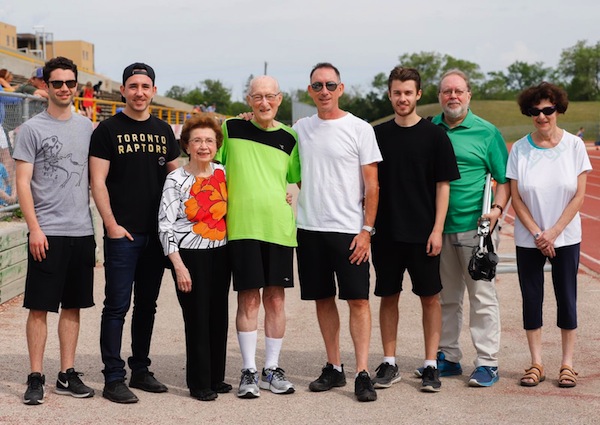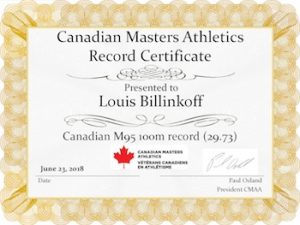With Lou Billinkoff, fourth from the left, are, from left to right, his grandson Asher, grandson Jordan, wife Ruth, son Errol, grandson Mitchell, son Lorne and daughter-in-law Marilyn. (photo from Lou Billinkoff)
Growing up in Winnipeg’s North End, Lou Billinkoff, 96, was never into sports, though, in his 20s, he did enjoy going for a jog once in awhile. Today, he is one of the fastest short-distance runners in his age group.
“I used to do some running but I never thought of it as competitive,” Billinkoff told the Independent. “I just ran for the pleasure of it when I was younger.”
Billinkoff worked as an engineer with Winnipeg Hydro (now called Manitoba Hydro) for 40 years, designing power lines. When he was well into retirement, at the age of 89, he had a heart attack.
“When I was recovering, the doctor suggested I take some rehab physical therapy at a centre they have here, a program specially suited for people recovering from heart attacks,” said Billinkoff. “Part of the program is to walk on a track. I did that for maybe a year and, when I recalled how much pleasure I got when I ran earlier in life, I thought I’d just try it out and see what I still could do.”
The first time Billinkoff tried, he could only run 40 metres but, more importantly, he liked it. Two days later, he ran 45 metres, and kept on adding distance with each try. Eventually, he was running well over 100 metres and loving it. So, he decided to set up a training program and reached the point at which he could run 100 metres 10 times in one session – a feat he refers to as “running a kilometre.”
“I did that for about two years,” said Billinkoff. “After that, I found it was getting too hard, so I went down to five times 100. Gradually, I found this too was getting too hard, so this past year or two, I’ve been running 50 metres.
“When I was running the 100 metres, my son, Errol, clocked me and said, ‘You know, you’re running in championship speed rankings?’ This was a surprise to me. Errol suggested I get into competition. I wasn’t really interested to pursue it, but Errol entered me into a competition here and, the first time I ran, I ran quite well.”
Nowadays, Billinkoff runs 50 metres three times per workout session at the Reh-Fit Centre, where he goes three times a week. While he ran outdoors when he was younger, he feels that, at his age, it is wiser to run at the centre.
“Going outside has limitations,” he said. “The weather is not always good. You can fall and break your neck and nobody would see you. It’s not a good idea to be running outside.”
Once Billinkoff hit the competitive circuit, he began sending his running times to Athletics Canada.
“The way the rankings work is that age groups go in five-year periods,” he explained. “So, when I started out, I was in the age group of 90-94. They call that the M90. Now that I’m 96, for the last year and this year, I’m in the M95 group, which is 95 to 99.
“In the M90 group, I had the fastest time in Canada, at 29.73 seconds. And, in the M95 group, in the 50-metre record, my time indoors was 14.58 seconds; a good speed. Later, I ran the outdoor in 15.68 seconds, and I had strong wind against me. It took me a second longer and I attribute that to the wind.”
In most races, Billinkoff has been the only runner in his age category, often running with people half his age.
“There are so few people my age running that you very seldom – unless you live in New York or Chicago – get more than three or four people running in my age group,” said Billinkoff. “I don’t think it’s worth the effort for me to spend several days of discomfort and hardship [traveling] to run for a couple of seconds. They have a Canadian registry where all the Canadians who are competitors send in their results and they set up their rankings. Then, they send it to a world organization that sets up the rankings throughout the world.”
A few years ago, Billinkoff hired a coach for a few months. “He gave me some tips about getting away fast from the start,” said Billinkoff. “And he explained that running is just as much psychological as it is physical. He helped me, psychologically, to have confidence, and that’s very important.”
For now, Billinkoff is keeping up with his training, hoping to compete again next summer. He will continue to do so, he said, “as long as I’m able, and I get pleasure out of it.”
Rebeca Kuropatwa is a Winnipeg freelance writer.



